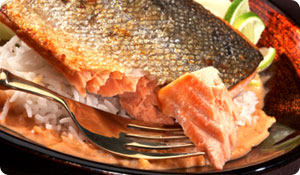
If you've been adding fish to your diet to help boost your health, you should also be conscious of your preparation method of choice. According to research from the University of Hawaii, which looked at the source, type, amount and frequency of dietary omega-3 consumption among men and women from different ethnic groups, baked or broiled fish is better for you than fried, salted or dried fish. Plus, adding low-sodium soy sauce or tofu to the fish enhances the heart-healthy benefits.
Findings also suggest that cardiovascular advantages vary by gender and ethnicity. For example, overall, men who consumed about 3.3 grams of omega-3 fatty acids per day had a 23 percent lower risk of cardiac death compared to those who consumed just 0.8 grams a day. Caucasian, Japanese-American and Latino men appeared to reap the most benefit from omega-3 fatty acids than African-American or Hawaiian men, possibly because of how they cook the fish or genetic predisposition, according to lead researcher, Lixin Meng, M.S.
While the link between intake of omega-3 fatty acids from fish sources and heart health wasn't as strong in women, women did appear to get heart protection from eating low-sodium soy sauce and tofu, suggesting that getting omega-3 fatty acids from plant sources rather than fish sources may be better for women.
Until more is known about which sources of omega-3 fatty acids are most beneficial for you, your best bet is to plan a daily diet that includes a variety of omega-3 heart healthy foods. While you can take an omega-3 or fish oil dietary supplement to reap some of the heart-protective advantages, you won't get the other nutrients, like selenium, found in fish.
Foods Rich in Omega-3 Fatty Acids
The American Heart Association (AHA) recommends eating fatty fish high in two kinds of omega-3 fatty acids, eicosapentaenoic acid (EPA) and docosahexaenoic acid (DHA), at least two times a week. The best fish sources are:
- Salmon
- Mackerel
- Lake trout
- Herring
- Sardines
- Albacore tuna
The AHA also suggests including oils and foods rich in alpha-linolenic acid (ALA), including
- Flaxseed, canola and soybean oils
- Flaxseed, walnuts, butternuts





